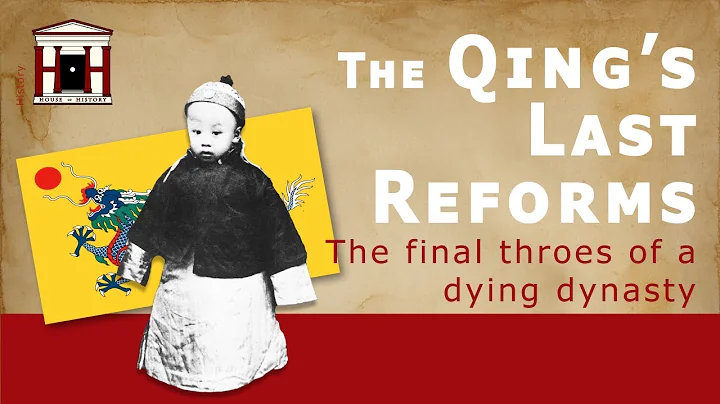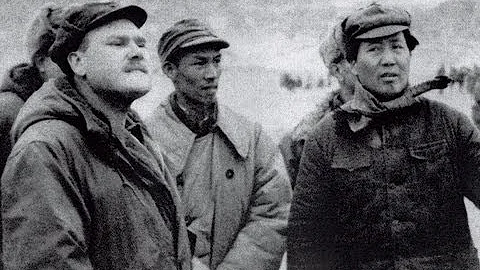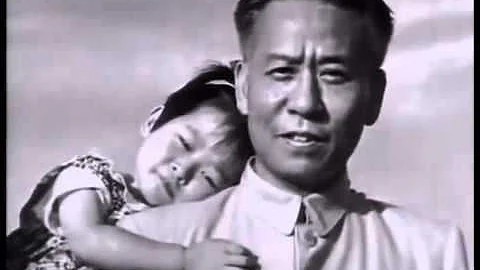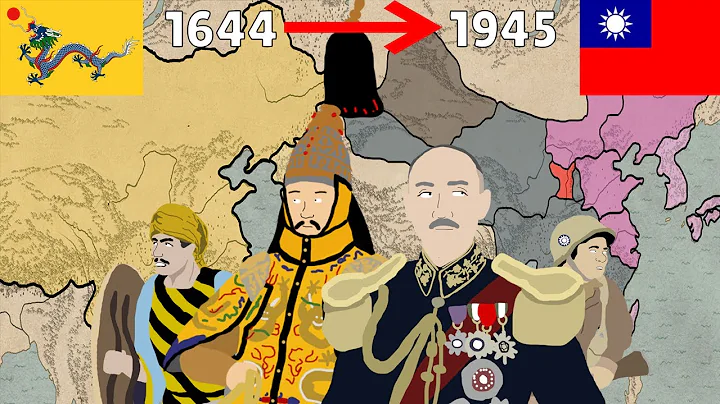Many historical figures are famous for their literary talents or their outstanding martial arts. In fact, many people you think of as civil servants also have superb martial arts and military exploits. There are also many generals who are actually Confucian generals who have read poetry and books.
Today we will take stock of those "civilians and military generals" that you would not expect.
Yan Zhenqing
When it comes to Yan Zhenqing, people mostly mention his calligraphy attainments. Together with Liu Zongyuan, he is known as "Yan Liu" and is a ground-breaking master figure in the calligraphy world.

Yan Zhenqing’s calligraphy inscription
But in addition to being a great calligrapher of the generation, Yan Zhenqing was actually one of the generals who saved the Tang Dynasty in the "Anshi Rebellion".
The Yan family is a wealthy family in the Langya area, and its ancestor is Confuciusthe famous discipleYan Hui. The fifth ancestor of Yan Zhenqing, Yan Zitui, moved to Chang'an in the Sui and Tang Dynasties and settled there. Yan Zhenqing was born in Dunhuafang, Wannian County, Chang'an in the third year of Zhongzong Jinglong's third year (709).
Yan Zhenqing's childhood and youth coincided with the prosperous Tang Dynasty. In the 22nd year of Kaiyuan (734), Yan Zhenqing officially entered the official career as a Jinshi. By the time of Tianbao reign (the 4th year of Xuanzong reign), he had been promoted several times and became the prefect of Pingyuan. Here, Yan Zhenqing faced the most significant test in his life.

I also didn't expect that Teacher Tang Guoqiang also starred in Yan Zhenqing
Tianbao In the fourteenth year (755), An Lushan launched a rebellion on the pretext of "concerning the country's danger" and cleaning up the traitor Yang Guozhong. This is the "Anshi Rebellion" that changed the destiny of the country in the Tang Dynasty. At this time, the Pingyuan County governed by Yan Zhenqing happened to be within the jurisdiction of Anlu Mountain. Under the iron heel of Anlu Mountain, all counties and counties in Hebei were defeated by Anlu Mountain, except Pingyuan City, which had tight defenses and resisted alone.
There were only 3000 Jingsai Army in Pingyuan City. Yan Zhenqing recruited more than 10,000 people and appointed Li Ze to be the commander. Under the leadership of Yan Zhenqing, surrounding Raoyang, Jinan, Qinghe, Jingcheng and other places came to seek refuge. Suddenly, Yan Zhenqing's army became the biggest thorn in An Lushan's back, seriously hampering the rebels' actions.
After more than a year of hard struggle, Yan Zhenqing saw that Pingyuan and other places could no longer hold on. So he led his troops to Fengxiang to pay a visit to the newly enthroned emperor Li Heng. Li Heng was grateful for Yan Zhenqing's outstanding performance behind enemy lines, and named him the Minister of the Ministry of Constitution, and later transferred him to the imperial censor.

Later Yan Zhenqing went through the three dynasties of Suzong Li Heng, Daizong Li Yu, and Dezong Li Shi. He was once granted the title of Duke of Lu and presided over the affairs of the Shangshu Province. However, he was later squeezed out by the powerful officials of the dynasty several times, and his official career experienced ups and downs.
In the fourth year of Emperor Jianzhong's reign (783), the 74-year-old Yan Zhenqing was recommended by Lu Qi to go to the rebel Li Xilie army to deliver the decree. Li Xilie tried to force Yan Zhenqing to do things for him, but Yan Zhenqing refused. It was not until August of the first year of Xingyuan (784) that he was killed by the rebels.
After half a year, the rebellion subsided. Yan Zhenqing's bones were returned to the capital and buried in Yan's Ancestral Hall . Dezong therefore deposed the court for five days and gave him the posthumous title "Wenzhong".
Wenzhong, the posthumous title second only to " Wenzheng" among the posthumous titles of ancient civil servants. In history, only a few super talented people with both political integrity and talent can obtain the posthumous title. For example, Su Shi , Ouyang Xiu in the Song Dynasty, Zhang Juzheng , Yang Ting and in the Ming Dynasty, Lin Zexu , Li Hongzhang , Fu Heng and others in the Qing Dynasty.

Yan Zhenqing's "Manuscript for Nephew Sacrifice"
Although Yan Zhenqing was handed down for his literary talent and calligraphy, he was actually a famous military commander in the Tang period.
Fan Zhongyan
Speaking of Fan Zhongyan, most people will think of his work "The Story of Yueyang Tower ". This is Renzong Fan Zhongyan made it for his friend Teng Zijing in the sixth year of Qingli (1046). Teng Zijing was demoted to Yueyang Tower in Yuezhou for some reasons. In order to gain political achievements, Teng Zijing began to rebuild Yueyang Tower in the fourth year of Qingli.In the fifth year of Qingli, Yueyang Tower was repaired. In order to increase the popularity of Yueyang Tower, Teng Zijing invited Fan Zhongyan to inscribe "Yueyang Tower" to " belong to my composition to record it".

The Yueyang Tower, one of the three famous towers
The reason why Fan Zhongyan is famous all over the world and has enough fame to add weight to the Yueyang Tower is mainly because of his New Deal and military industry.
Fan Zhongyan's New Deal took place in the early years of Renzong's Qingli reign, so it was called " Qingli New Deal " .
In the fourth year of Qingli (1044), Renzong ordered Fan Zhongyan, Fu Bi, Han Qi to be in power, and Ouyang Xiu and others served as admonishers to jointly implement the Qingli New Deal. As the host of the Qingli New Deal, Fan Zhongyan also proposed four foreign policies in this year: "The first is peace, the second is defense, the third is war, and the fourth is preparation." He also proposed seven management methods for border affairs, namely "". First, secret management; second, discuss military garrison; third, specialize in dispatching generals; fourth, eager to teach war; fifth, train volunteers; sixth, repair The outer city of the capital; 7, the secret crusade plan ".
Unfortunately, the New Deal was implemented for less than a year. In the first month of the fifth year of Qingli, Fan Zhongyan asked himself to be transferred to Pizhou.

Fan Zhongyan
The reason why Fan Zhongyan was so concerned about border issues This is clear precisely because he has guarded the northwest frontier for many years. Since the first year of Kangding (1040), Fan Zhongyan has been commanding the Yongxing Army as a direct bachelor of Longtuge .
Under his governance, The army changed the old system and became a powerful force on the border of the Song Dynasty. There were many powerful generals under its command. For example, the most famous general of the Song Dynasty, Di Qing, was a military general under Fan Zhongyan. All actions ended in failure. Moreover, he also trained a generation of famous generals such as Di Qing, kinds of Shiheng, and Guo Kui for the Song Dynasty.
Under the leadership of Fan Zhongyan, even though the founding emperor of Xixia, Li Yuanhao, had challenged him for many years, the northwest frontier of the Song Dynasty failed. It became more and more solid. So much so that Renzong once said "If Zhongyan comes to help, I will have no worries." Because of his outstanding military capabilities, the northwest frontier of the Song Dynasty became the strongest in the Song Dynasty during the three years that Fan Zhongyan guarded it. Fortress.

In the third year of Qingli (1043), Li Yuanhao, who knew that he could not break through Fan Zhongyan's defense line, formally proposed peace to the Song Dynasty.
Therefore, the Song Dynasty could not be affected by the war during the years when the powerful enemy Dangxiang people in the northwest were prosperous. Relying on Fan Zhongyan's outstanding military leadership ability.
In the fourth year of Huangyou (1052), Fan Zhongyan went to Yingzhou to take office. Five months later, he died of illness in Xuzhou at the age of 64.
After learning that Fan Zhongyan died of illness, Renzong was deeply moved. He personally inscribed a "Stele of Praise for the Worthy" and gave him the posthumous title "Wenzheng". Later emperors awarded him numerous awards. Emperor Kangxi also invited him to worship in the Confucius Temple, and later included him in the "Temple of Emperors of the Past".

The "Stele of Praise for the Worthy" written by Song Renzong
Wang Shouren
mentioned some of the figures who had the most profound influence on later generations in the Ming Dynasty. Wang Shouren, the founder of Yangming's psychology, can definitely be ranked at the top of the list.
Wang Shouren, whose courtesy name was Bo'an and whose name was Yangming. He is the master of the Ming Dynasty's spiritual philosophy and a master-level idol who is infinitely worshiped by countless important historical figures in later generations. His disciples and descendants are not only spread throughout China, but also have many important believers in Japan and Korea. For example, the legendary Japanese entrepreneur and the sage of management, Kazuo Inamori, is a loyal believer in Yangming's philosophy of mind.

Wang Shouren
Those who have read " Those Things in the Ming Dynasty " written by Mingyue that year must be very familiar with his life.
Wang Shouren's father was Wang Hua, the number one scholar in the Chenghua Dynasty. During the Zhengde period, he became the Minister of the Ministry of Personnel in Nanjing. I was the number one scholar, but Wang Shouren was not interested in the imperial examination when he was a teenager. Later, under his father's coercion and inducement, he finally won the Jinshi in the twelfth year of Hongzhi reign (1499).
Wang Shouren, who had just entered the official position, caught up with the new emperor Zhengde who ascended the throne, and the powerful eunuchs Liu Jin became dictatorial. Wang Shouren's uprightness offended Liu Jin and was sent to Guizhou Longchang Station to become a postmaster. His official career was not going well, but it was in Longchang that Wang Shouren succeeded in enlightenment. With the fall of Liu Jin, Wang Shouren's career gradually returned to the right track. Until the eleventh year of Zhengde (1516), Wang Shouren was sent to Gannan to serve as governor.

It is said that this is the cave where Wang Yangming attained enlightenment, and it has now become a tourist attraction.
The southern region of Jiangxi is located in a mountainous area. Since ancient times, poverty has led to strong folk customs. The southern region is also plagued by bandits due to inconvenient transportation, and the government has historically been unable to quell banditry. Until Wang Shouren's arrival.
In the twelfth year of Zhengde (1517), Wang Shouren led his elite troops to attack personally, seizing more than 40 enemy camps and capturing more than 7,000 people. Later, they continued to attack the surrounding bandits, until October of that year, the bandits in southern Jiangxi were basically eliminated. Within one year of taking office, Wang Shouren solved the banditry problem that had been unresolved for decades. Since then, Wang Shouren's name has spread all over the country.
In the fourteenth year of Zhengde (1519), Wang Shouren originally planned to go to Fujian to quell the banditry. When I walked to Fengcheng, Jiangxi Province, I heard about Prince Ning's rebellion and immediately went to Ji'an to organize a counter-rebellion. With the help of Wang Shouren's tactics of suspecting troops and delaying troops, King Ning was trapped in the Jiangxi area. After gathering tens of thousands of troops, Wang Shouren fought a decisive battle with King Ning at Poyang Lake . After three days of fierce fighting, King Ning was captured. King Ning's Rebellion was ended by Wang Shouren after only 35 days.

Prince Ning in "Tang Bohu Spots Autumn Fragrance" played by Lin Wei
With the blessing of military achievements in southern Jiangxi and the suppression of Prince Ning's rebellion, Wang Shouren became a "military god"-like existence during that period. In the following years, Wang Shouren was either fighting the rebellion or on the way to fight the rebellion.
In the sixth year of Jiajing (1527), Guangxi national leaders Lu Su and Wang Shou rebelled. Wang Shouren was ordered to go to quell the rebellion. In December, as soon as Wang Shouren arrived in Sien, the rebel leaders Lu and Wang immediately surrendered to him. Later, the two kings of Lu became the pawns of Wang Shouren's army, and made great achievements in helping Wang Shouren quell the rebellion in Guangdong and Guangxi.
The rebellion was quickly put down, but Wang Shouren's body had been severely damaged by the disease.
On November 29, the seventh year of Jiajing (1529), Wang Shouren died of illness on a ship in Dageng County (now Dayu County), Nan'an Prefecture, Jiangxi Province. Before his death, his disciples asked him what his last words were. Wang Shouren just replied softly: "My heart is bright, so what else can I say?" .

Wang Yangming's spiritual work "Zhuanxi Lu"
Wang Shouren was named Guanglu Doctor, Zhuguo and Xinjian Bo by Emperor Jiajing because of his outstanding military exploits and extremely high spiritual attainments. Emperor Longqing posthumously awarded him the title of Marquis of Xinjian, with the posthumous title of "Wencheng". During the Wanli year, Wang Shouren was enshrined in the Confucius Temple.
Xin Qiji
When he was drunk, he read the sword by burning the lamp, and dreamed of blowing the trumpet. Eight hundred miles away, the soldiers under the command are burning, the sound of fifty-stringed strings is heard outside the Great Wall, and the troops are ordered in autumn on the battlefield.
This poem is one of the few ancient poems in "Bright Sword" that Li Yunlong can memorize. The author of the poem is the famous general Xin Qiji.

Wu Zehao's painting "Watching a Sword while Drunk and Burning the Lamp"
From the lyrics and background introduction, many people will think that Xin Qiji is a patriotic scholar who has no way to serve his country. But in fact, Xin Qiji was most famous for being a handsome man at the time.
Xin Qiji was born in Shaoxing, the tenth year of Emperor Gaozong of the Southern Song Dynasty (1140). Although the territory of the Northern Kingdom had been taken away by the Jin when he was born and he was also a Song person born in the Jin Kingdom, Xin Qiji, who had known the shame of Jingkang since he was a child, had made it his mission to regain the Song Dynasty throughout his life.
In the thirty-first year of Shaoxing (1161), Jin Dynasty Wan Yanliang led his army to invade the south. The 21-year-old Xin Qiji led the descendants of the Song people in Shandong to rebel against the Jin Dynasty, and also led thousands of people to join Geng Jing's uprising army. From then on, Xin Qiji began his military career.

A statue of Xin Qiji in his youth
However, the next year, the rebel general Zhang Anguo killed the rebel leader Geng Jing. Xin Qiji risked his own life and raided tens of thousands of troops with 50 men. He captured Zhang Anguo in his tent and returned south to the Song Dynasty. Such heroic performance made Xin Qiji famous. Emperor Gaozong of the Song Dynasty personally received him and conferred him the title of Jiangyin Signor. This year, Xin Qiji was 23 years old.
Xin Qiji, who came to the Southern Song Dynasty, did not understand the idea of peace in the court. During the reign of Emperor Xiaozong of the Song Dynasty, he repeatedly stated his proposals and plans for the Northern Expedition, and also wrote memorials such as "Ten Essays on Meiqin" and "Nine Discussions". But the emperors and ministers of the Southern Song Dynasty who advocated peace shelved these remarks. As time passed, Xin Qiji also understood the reality, which made him extremely sad and angry.
After experiencing the four dynasties of Gaozong, Xiaozong, Guangzong and Ningzong, Xin Qiji served as a transshipment envoy in many places. But the voices of the entire imperial court regarding the Northern Expedition were getting smaller and smaller. In the third year of Jiatai of Ningzong (1203), Han Yuzhou, the main war faction, took charge and activated Xin Qiji. Xin Qiji, who was 64 years old at this time, immediately packed up his armor and became the prefect of Shaoxing and the pacification envoy of east Zhejiang. The following year, when he met with Ning Zong, he also admonished that the Jin Kingdom must be destroyed, which was deeply appreciated by Ning Zong. He was appointed as the magistrate of Zhenjiang, and became a feudal official in the northern border of the Southern Song Dynasty.

Beigu Mountain under the sunset
It was also in this year that 64-year-old Xin Qiji climbed to Beigu Pavilion on Beigu Mountain in Zhenjiang and left the song "Yong Yu Le·Jingkou Beigu Pavilion Nostalgia" :
Throughout the ages, there is no hero to be found, and Sun Zhong is looking for a place. On the dance pavilion and singing stage, the wind is always blown away by the rain. The setting sun, the grass and trees, the ordinary alleys, where the slaves of humanity once lived. I remember the time when I was a strong warrior and an iron horse, so angry that I could swallow thousands of miles like a tiger.
Yuan Jia hastily sealed the wolf in Xu, and won the hasty visit to the north. Forty-three years later, I still remember the beacon fire on Yangzhou Road. But looking back, there is a sacred crow drum under the Buddha Temple. Who can ask, Lian Po is old, can he still make a living?
The sentence "Who can ask, Lian Po is old, can he still make a living?" showed Xin Qiji's determination to serve the country with his fists and fists, and also saw his determination to guard the northern border and prepare to serve the country with his life. However, those main battle actions were just the political means of the Southern Song Dynasty monarchs and ministers. In fact, the Southern Song Dynasty monarchs and ministers had already had the courage to make the Northern Expedition.
It's sad. Xin Qiji lamented that General Lian Po, Lao Ji, was still able to gallop on the battlefield. It was a pity that Xin Qiji never waited for the monarch who asked him "whether he can still make a living" throughout his life.
In the third year of Kaixi (1207), Xin Qiji, who was seriously ill, was once again appointed as the Privy Council. But before the edict arrived, Xin Qiji was already bedridden. On the tenth day of September, Xin Qiji passed away at the age of 68 with the regret of having no way to serve his country. Before his death, Xin Qiji only left two last words: "Kill the thieves! Kill the thieves!" and nothing else.

Yashan Sea Battle
In the sixth year of Shaoding (1233), Emperor Lizong of the Song Dynasty gave a posthumous gift to Doctor Xin Qiji Guanglu. In the first year of Deyou (1275), the Mongolian and Yuan armies had marched south to Sichuan, and the Southern Song Dynasty was once again in danger of destruction. In this year, Emperor Gong of the Song Dynasty Zhao 㬎 posthumously awarded young master Xin Qiji the posthumous title "Zhongmin" in the hope that the emperor and his ministers would work together to fight against the enemy. It was a pity that the treacherous minister Jia Sidao and others caused chaos in the court, and the Song Dynasty had no chance to continue. Just four years later (1279), as Lu Xiufu took the last emperor Zhao Bing and jumped into the sea to commit suicide, the Song Dynasty was completely destroyed.

Lu Xiufu jumped into the sea with the last emperor of the Song Dynasty on his back





















